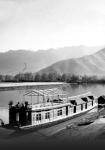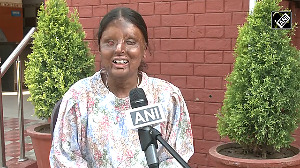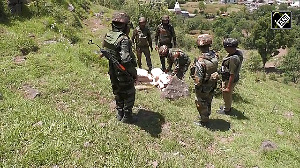'Given the possibility that our unstable northern and western borders may become 'live' at short notice, any major systemic change which impacts combat effectiveness should be brought about in a cautious and progressive manner.'

Admiral Arun Prakash (retd) has emerged as one of the major critics of the Agnipath scheme.
"Given the serious military threats confronting India, modernisation of the armed forces is a national security imperative, for which funds have to be found. The alternatives are too terrible to contemplate," says the admiral, who served as chief of the naval staff between July 2004 and October 2006.
"There are any number of ways that the finance ministry can find resources for this purpose; curbing wasteful government expenditure being just one," the admiral tells Rediff.com Senior Contributor Rashme Sehgal in the concluding segment of a two-part exclusive interview.
The other apprehension is that the release of so many personnel trained in the use of arms on an annual basis will result in the militarisation of our society resulting in more conflict within our society.
Is this something you also fear?
Such a situation need not arise, provided the government can ensure, that each de-mobilized Agniveer is provided further education and also provided gainful employment in the central or state police forces, civil services, Indian Railways, PSUs, and banks.
However, past experience has consistently shown that the home ministry as well as state governments are most reluctant to accommodate ex-servicemen in any of the police forces or civil services.
In the other sectors, they are offered jobs well below their experience and skills.
The corporate world, too, has been quite unhelpful in this regard.
In view of this, government promises about post-demobilisation rehabilitation will carry conviction, only if backed by Parliamentary legislation along the lines of the GI Bill in the USA that can ensure compliance.
You have also been quoted as saying that given our perilous security situation with China and Pakistan flanking our northern and western borders, this is hardly the time to have introduced an untried recruitment system.
Given the possibility that our unstable northern and western borders may become 'live' at short notice, any major systemic change which impacts combat effectiveness should be brought about in a cautious and progressive manner.
The armed forces are presently understaffed. How understaffed is the navy at present?
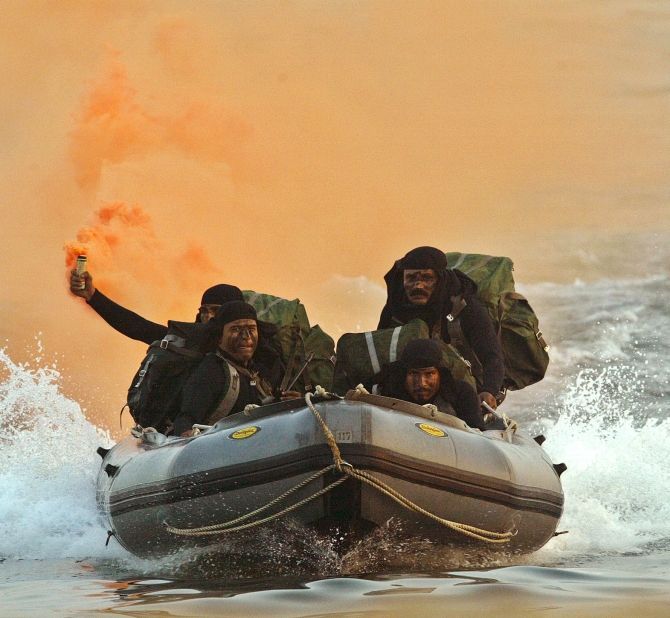
I am not aware of the current manning situation of the armed forces.
However, the navy's approved perspective plans envisage certain accretions in terms of warships, submarines and aircraft/helicopters over the next few years.
The maritime security scenario in the Indo-Pacific may warrant even further growth.
Under these circumstances, the navy's manpower will need to be enhanced rather than curtailed.
This scheme has been introduced to save money so as to ensure great financial allocation for the modernisation of the armed forces.
Let us bear in mind that the current pension liabilities of the government will continue for many decades, before manpower curtailment shows any significant reduction in the pension bill.
Moreover, given the serious military threats confronting India, modernisation of the armed forces is a national security imperative, for which funds have to be found.
The alternatives are too terrible to contemplate.
There are any number of ways that the finance ministry can find resources for this purpose; curbing wasteful government expenditure being just one.
In a separate context, rationalising and right-sizing of our military manpower is certainly called for, but linking pensions to force modernisation seems myopic as well as illogical.
The announcement of this scheme saw social unrest amongst our youth who now believe a major source of employment in the armed forces has now been taken away from them.
The sudden and total cessation of the earlier recruitment paradigm was neither necessary, nor prudent.
Introducing the Agnipath scheme in a progressive manner, in parallel with the old recruitment system, would have provided flexibility in implementation of the new scheme, and kept turbulence in the military-system to a minimum.
Above all, it could have avoided the angst and trauma amongst aspiring recruits, that led to violence and destruction of public property.
Having said that, it seems strange that no intelligence agency had an inkling of the brewing violence.
Nor did any politician or civil servant -- given their extensive exposure to urban and rural India -- anticipate the public impact of such a radical curtailment in employment opportunities.
Russia was forced to cancel its policy of conscripts fighting in the Ukraine. Chinese soldiers also want to exit the army at the earliest which is one of the reasons why they have focused so much on technology.
When conscription is being questioned around the world, why are we opting for it?
The Agniveer scheme does not amount to 'conscription' because the entrants are all volunteers, whereas conscription demands mandatory military service by all eligible youth.
Comparison with small, countries like Singapore, Israel or even Russia is inappropriate, because they suffer from grave shortages of male volunteers for military service.
It is for this reason that they have to resort to conscription of young males (and often even females) to make up the numbers required for national defence.
India will never have this problem, because prevailing unemployment ensures an overwhelming response to any military recruitment campaign.
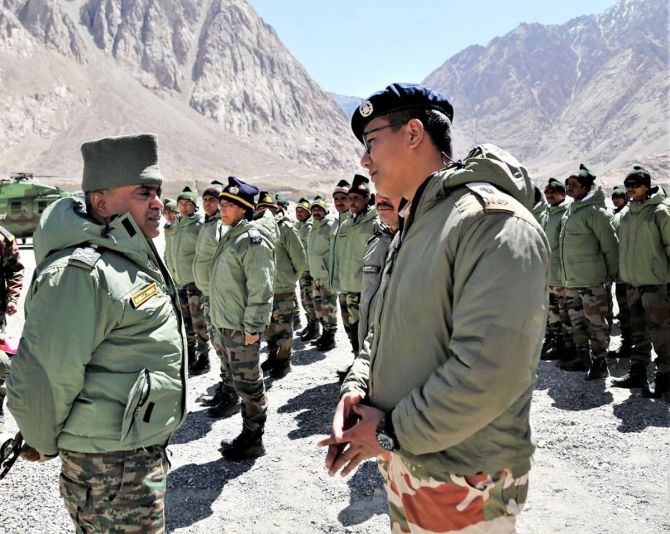
Why do you believe India has not brought out a White Paper on national security so far?
India is alone, among major powers, which suffers from the lack of an institutional process which would generate defence reviews, policy white papers and national security strategies. The reasons for this lacuna are threefold.
Firstly, the indifference of the politician, whose preoccupation with electoral issues prevents him from devoting the necessary time and attention -- other than episodically -- to defence-related issues.
Secondly, in the absence of a professional defence bureaucracy, the MoD is run by functionaries drawn from assorted streams of the civil services who are transient and mostly, lacking in adequate knowledge of military affairs and military technology.
Lastly, any formal and realistic assessment of national interests, threats and defence capabilities will throw up demands for political and financial commitments, which the system is unwilling or unable to provide.
Feature Presentation: Aslam Hunani/Rediff.com






